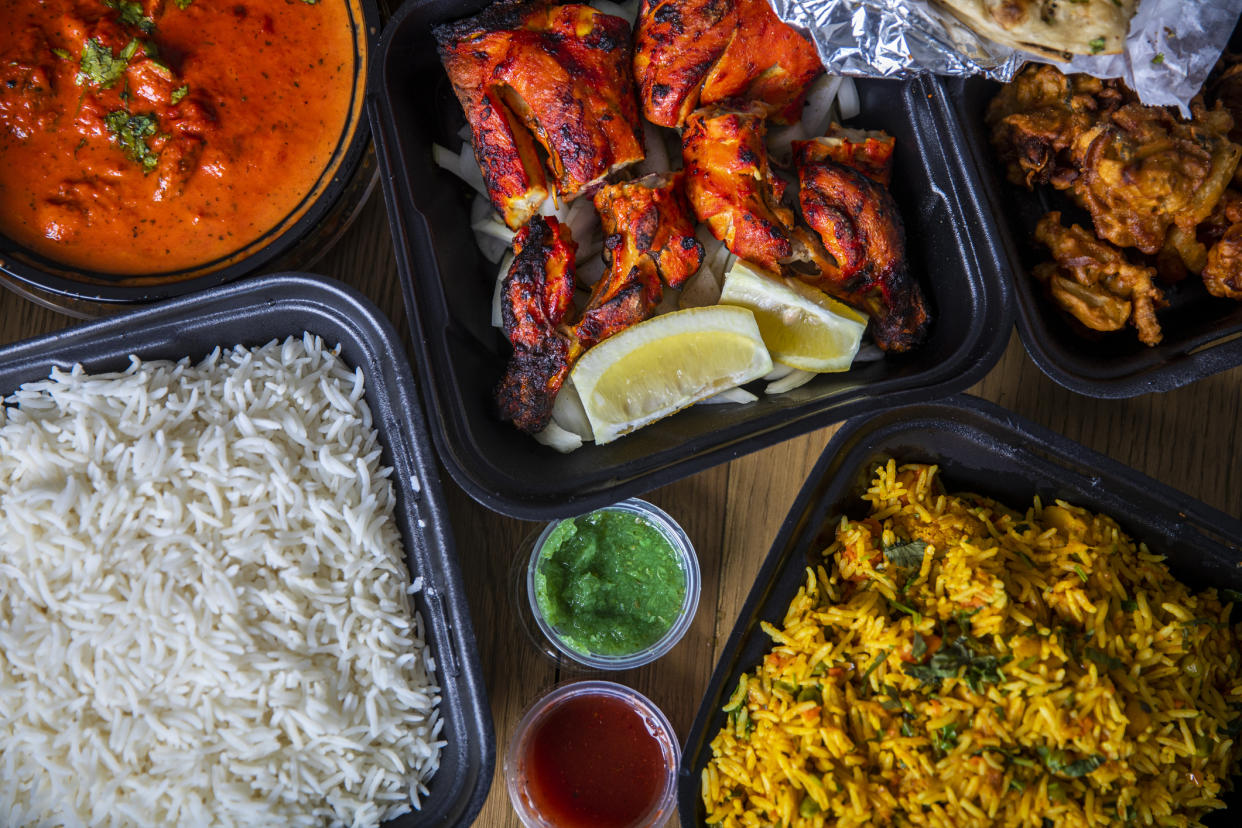Need a mood-boost in a hurry? Order sushi or a curry

Planning on celebrating the weekend by ordering a takeaway? As well as offering an end-of-the-week treat, it turns out piling into a curry is also good for your mental health - or so says science.
New research, by Lieferando.at, has revealed that eating a curry boosts our happiness more than any other takeaway.
The moods of 2,158 volunteers were analysed by a research team using a Brief Mood Introspection Scale (BMIS) before they ordered a takeaway, and then again after they had scoffed it, in a bid to find out how ‘happy’ eating each meal had made them.
The average BMIS score before eating a takeaway - based on current mood and happiness levels - was 142.
Turns out ordering any kind of takeaway meal increases happiness by an average of 52%, but after eating a curry, the average mood of those taking part shot up to 260 on the BMIS scale, a rise of 83%.
Read more: Coffee cuts liver disease death risk in half, study suggests
Sushi came in second spot with a 73% soar in happiness after scoffing, with participants reporting a significant boost in positive emotions after tucking into some Alaska rolls.

Meanwhile chowing down on a burger makes us 70% happier than we were before, increasing participants' BMIS score from 142 to a healthy 242 points (+100 points).
Surprisingly, fish and chips, which often tops Brits’ favourite dish, only boosts our mood by 18%, with a BMIS score of 168, putting it in 10th spot.
According to Lee Chambers, psychologist and wellbeing consultant there's a reason certain foods can have a positive impact on our mental wellbeing.
"From a psychological perspective, food alters our mood through several pathways," he explains. "Firstly, the idea of comfort food is not a myth; we can use food as a coping mechanism when we are feeling stressed, anxious or bored to anchor us in the present while enjoying it."
Watch: Six ways to eat healthier without even trying.
Due to recent events and the limitations on some forms of entertainment, Chambers says food has become even more powerful in being both a measure of happiness and an experience that is reassuringly the same every time.
"When we look at the brain chemicals at play, our favourite takeaway can trigger dopamine release," he continues.
"Even just thinking about it can stimulate this, generating a craving that we can then satisfy. An elevated cortisol level can also induce a craving for foods that create a level of comfort, especially foods with higher levels of fat."
On the opposite end of the scale ghrelin and leptin, our hunger hormones, can also impact our emotions and drive our eating behaviours.
"When we are hungry, and our blood sugar is low, we find it harder to manage our emotional regulation and balance, and this can lead to moments of becoming ‘hangry’."
Read more: Starting the day with chocolate helps post-menopausal women burn fat

And it isn't just takeaway food that can give a boost in the happiness stakes.
Separate research by City Pantry has revealed dark chocolate to be among the best mood-boosting foods.
The Productivity Pick-Me-Ups study found that dark chocolate can have a positive impact on our wellbeing, thanks to its ability to lower inflammation, improve brain function and even reduce the risk of heart disease.
According to Dr Uma Naidoo, psychiatrist and nutrition specialist, for a happiness hit we should be looking to eat foods that reduce inflammation, as this causes low energy levels and fatigue.
“Low-grade inflammation flips off a metabolic switch in the chemical pathway that produces energy," she explains.
"When inflammation is present in the body, less energy is available to the brain, so it’s important to eat anti-inflammatory foods to ensure people wake up in a good mood and stay energised and focused through the entire morning.
“This means pursuing a diet that’s rich in colourful, non-starchy vegetables that add polyphenols, which fight inflammation, stabilise your insulin levels and nurture your brain, gut microbiome and overall body."
Read more: Fasting 'no magic bullet' for weight loss
Dr Naidoo says we should try to include polyphenol-rich cauliflower, carrots, red pepper, cabbage, dark chocolate, broccoli, chestnuts, blackberries, apple cider vinegar, onion and garlic into our diet.

“Also, fat is a key component for mental health," she adds. "Your brain is made up of 60% fat and in order to perform at its best, it requires a constant supply of omega-3-fatty acids.
"Make sure you include healthy fats like extra virgin olive oil, olives, avocados, chia seeds, hazelnuts, almonds and macadamias in your diet.”
Other foods Dr Naidoo recommends to boost positivity include
Leafy green vegetables, such as cabbage, broccoli and spinach
Healthy fats in the form of dark chocolate, nuts and fish
Raw fruits and vegetables like peppers and berries
Energy-boosting spices including turmeric, black cumin and chillies
Plant-based protein such as tofu and tempeh


